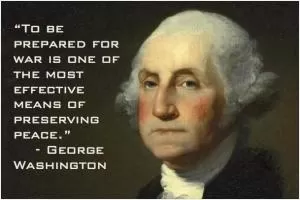There is a destiny which has the control of our actions, not to be resisted by the strongest efforts of human nature

There is a destiny which has the control of our actions, not to be resisted by the strongest efforts of human nature
George Washington, the first President of the United States, is often seen as a figure of destiny. From his humble beginnings as a young surveyor in the Virginia wilderness to his pivotal role in the American Revolution and the founding of a new nation, Washington's life seems to have been guided by a higher power. The quote "There is a destiny which has the control of our actions, not to be resisted by the strongest efforts of human nature" seems particularly apt when applied to Washington's life and legacy.Washington's rise to power was not without its challenges. He faced numerous setbacks and failures, including defeats on the battlefield and political opposition from within his own ranks. However, through it all, Washington remained steadfast in his belief that he was destined for greatness. His unwavering determination and resilience in the face of adversity are a testament to the power of destiny.
One of the most famous examples of Washington's belief in destiny is his decision to cross the Delaware River on Christmas night in 1776. Despite the harsh winter weather and the overwhelming odds against him, Washington led his troops in a daring surprise attack on the Hessian forces at Trenton. The victory at Trenton was a turning point in the Revolutionary War and helped to boost morale among the American troops. Many saw Washington's successful crossing of the Delaware as a sign that he was destined to lead the fledgling nation to victory.
Throughout his life, Washington exhibited a sense of purpose and determination that seemed to transcend mere mortal effort. His leadership during the Revolutionary War and his presidency were marked by a sense of duty and honor that inspired those around him. Washington's actions were guided by a deep sense of moral conviction and a belief in the righteousness of his cause.












 Friendship Quotes
Friendship Quotes Love Quotes
Love Quotes Life Quotes
Life Quotes Funny Quotes
Funny Quotes Motivational Quotes
Motivational Quotes Inspirational Quotes
Inspirational Quotes